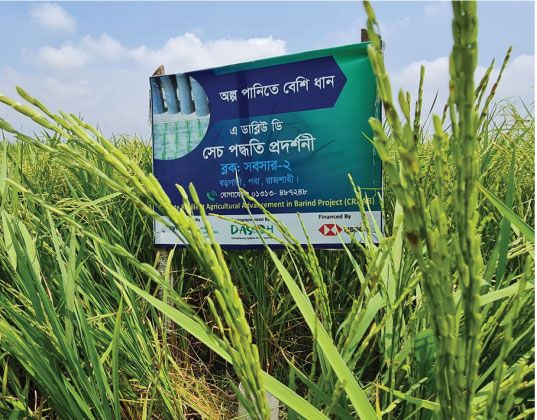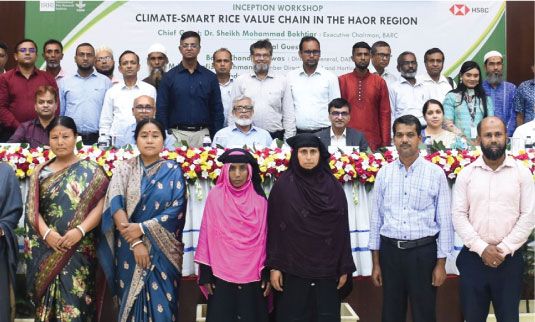- info@ficci.org.bd
- |
- +880248814801, +880248814802
- Contact Us
- |
- Become a Member
- |
- |
- |
- |
- |

Bangladesh, a country where rice is synonymous with culture, nutrition, and food security for over 170 million people, stands as the third largest rice producer in the world. Rice production holds great significance in the economy contrib- uting towards 16 percent of national GDP, as per FAO data. With only 0.05 hectares of arable land per person, the unsung heroes of the country produced 57 million tonnes of rice in the year 2022 (FAO, 2023).
Ranking seventh on Germanwatch's 2021 Global Climate Risk Index, climate change is a major concern in Bangladesh. In recent years, the country has witnessed devastating floods, drought, cyclones with infiltration of salinity, untimely rains and extreme heat which affect crop cycle and production.
To better equip farmers tackle climate change and to increase rice production, HSBC has extended its support to developing adaptability measures such as Climate-Smart Agriculture (CSA). This is an approach helping transform agri-food systems towards green, climate resilient practices. The initiatives not only include rice production in the flood-prone Haor region but also in the drought stricken Barind region.
Water Efficiency and Rice Production in the Barind Region

In collaboration with Syngenta and DASCOH Foundations, HSBC has initiated a climate-resilient, water-efficient irrigation method known as Alternate Wetting and Drying (AWD) in the country's Barind region. AWD is a low-cost, easy-to-adopt method enabling farmers to cut water usage by up to 30% without compromising on yield. AWD has also been shown to curb methane emissions by 30-70%, helping mitigate greenhouse gas emissions. This initiative is currently benefiting approximately 25,000 farmers across the Rajshahi, Chapainawabganj, and Naogaon districts, promoting climate-smart agricultural practices and improving irrigation efficiency.
Rice Production in the Haor Region

Climate-Smart Rice Value Chain (CS-RVC) inception workshop, June 2024
Addressing challenges like seasonal flooding and limited cultivation windows, HSBC has partnered with the Internation- al Rice Research Institute (IRRI) to launch the Climate-Smart Rice Value Chain (CS-RVC) project in the Haor region. The initiative aims to support 13,000 farming households across 30 villages in the Sunamganj and Kishoreganj districts by introducing resilient rice varieties, increasing access to machinery, and providing crop advisory services. These efforts will create a more sustainable and resilient rice value chain and ensure long-term farming viability in the Haor region.
The implementation of these interventions will set a precedent for climate-smart initiatives that can be undertaken in other vulnerable regions and climate hotspots nationwide.






